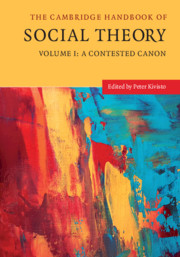Book contents
- The Cambridge Handbook of Social Theory
- The Cambridge Handbook of Social Theory
- Copyright page
- Contents
- Figures
- Tables
- Contributors
- Preface
- 1 The Emergence of Social Theory
- 2 “What Is a Classic?”
- 3 Karl Marx
- 4 The Marxist Legacy
- 5 Émile Durkheim: Theorist of Solidarity
- 6 What’s in a Name?
- 7 Max Weber
- 8 Weberian Social Theory
- 9 Georg Simmel and the Metropolitization of Social Life
- 10 Pounding on Parsons: How Criticism Undermined the Reputation of Sociology’s Incurable Theorist
- 11 Symbolic Interactionism
- 12 Erving Goffman and Dramaturgical Sociology
- 13 Structuralism
- 14 Norbert Elias, Civilising Processes, and Figurational (or Process) Sociology
- 15 Phenomenology and Social Theory
- 16 Pierre Bourdieu: An Intellectual Legacy
- 17 Developing Ethnomethodology: Garfinkel on the Constitutive Interactional Practices in Social Systems of Interaction
- 18 Jürgen Habermas
- 19 Anthony Giddens, Structuration Theory, and Radical Politics
- Index
- References
1 - The Emergence of Social Theory
Published online by Cambridge University Press: 03 December 2020
- The Cambridge Handbook of Social Theory
- The Cambridge Handbook of Social Theory
- Copyright page
- Contents
- Figures
- Tables
- Contributors
- Preface
- 1 The Emergence of Social Theory
- 2 “What Is a Classic?”
- 3 Karl Marx
- 4 The Marxist Legacy
- 5 Émile Durkheim: Theorist of Solidarity
- 6 What’s in a Name?
- 7 Max Weber
- 8 Weberian Social Theory
- 9 Georg Simmel and the Metropolitization of Social Life
- 10 Pounding on Parsons: How Criticism Undermined the Reputation of Sociology’s Incurable Theorist
- 11 Symbolic Interactionism
- 12 Erving Goffman and Dramaturgical Sociology
- 13 Structuralism
- 14 Norbert Elias, Civilising Processes, and Figurational (or Process) Sociology
- 15 Phenomenology and Social Theory
- 16 Pierre Bourdieu: An Intellectual Legacy
- 17 Developing Ethnomethodology: Garfinkel on the Constitutive Interactional Practices in Social Systems of Interaction
- 18 Jürgen Habermas
- 19 Anthony Giddens, Structuration Theory, and Radical Politics
- Index
- References
Summary
The emergence of “social theory” as a distinct intellectual genre represents a historic renewal of considerable importance. Tracing the development of key concepts allows us to understand its analytical specificity as compared to the traditional genres of inquiry (politics, law, morals, and political economy). It makes it possible to identify its formative period (between the Enlightenment and the early nineteenth century), and its most prominent pioneers – Montesquieu, Rousseau, and the Scottish moral philosophers.
Johan Heilbron is a historical sociologist, currently Professor of the Sociology of Education at Uppsala University and affiliated with the Centre européen de sociologie et de science politique (CESSP-CNRS-EHESS) in Paris and Erasmus University Rotterdam. Relevant books include The Rise of Social Theory (1995), The Rise of the Social Sciences and the Formation of Modernity (coedited, 2001), Pour une histoire des sciences sociales: hommage à Pierre Bourdieu (coedited, 2004), French Sociology (2015), and The Social and Human Sciences in Global Power Relations (coedited, 2018).
- Type
- Chapter
- Information
- The Cambridge Handbook of Social Theory , pp. 1 - 23Publisher: Cambridge University PressPrint publication year: 2020

